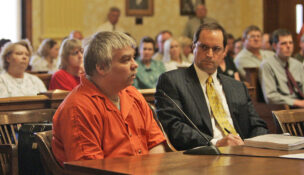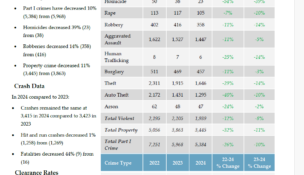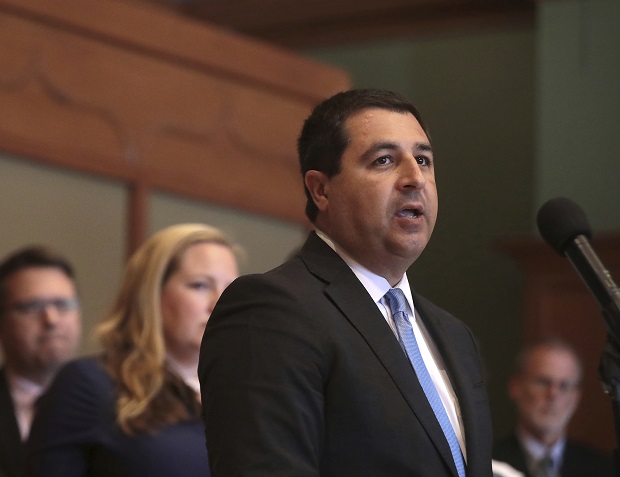Court considers emotional distress
By: dmc-admin//December 18, 2002//
The Wisconsin Supreme Court is considering whether a claim for negligent infliction of emotional distress can be brought in a medical malpractice case.
The court has allowed parents to seek compensation for the negligent infliction of emotion distress in accident cases where they witness the suffering of their children at the time or in the immediate aftermath of the accident. Now, a couple is asking the court to extend that consideration to parents when that suffering is caused by a medical mishap rather than an accident.
Earlier this month, the Supreme Court heard oral arguments in the case of Joseph Finnegan, et al. v. Wisconsin Patients Compensation Fund, et al., 01-2911. In that case, Joseph and Tanice Finnegan are seeking compensation for the emotional distress associated with watching their infant son, Jared, die.
Jared was running a fever, so the Finnegans took him to the pediatrician who ordered a blood culture. That evening, the laboratory called the pediatrician and the on-call doctor and advised them that the baby’s blood culture had come back positive for bacteria.
The Finnegans allege that the doctors failed to take steps that evening to make sure the baby was treated immediately. The couple did not learn of the blood infection until the following morning, when they took the baby back to the clinic. The pediatrician told them to drive Jared to the hospital.
On the way to the pediatric ward, Jared stopped breathing. The mother alerted a nurse, who initiated a "Code Blue" and the mother looked on as various medical procedures were performed on her baby. Jared was eventually flown to Children’s Hospital in Milwaukee, but the infection had progressed too far and he died later that day.
The Finnegans sued for wrongful death and negligent infliction of emotional distress, asserting that they suffered severe emotional distress after witnessing the unsuccessful attempts to save the life of their infant son. The wrongful death portion of the Finnegans’ claim was settled. Aurora Medical Group filed a motion in the trial court to dismiss the emotional distress claim, but Manitowoc County Circuit Court Judge Fred H. Hazelwood denied the motion. On appeal, the District II Court of Appeals certified the case to the Supreme Court.
Bowen Claims
In 1994, the Supreme Court determined that a mother could bring a claim for negligent infliction of emotional distress after she witnessed the immediate aftermath of an accident involving her 14-year-old son. That case was Bowen v. Lumbermen’s Mutual Casualty Co., 183 Wis.2d 627, 517 N.W.2d 432 (1994), and those types of claims became known as Bowen claims.
Although Sharon Bowen did not witness the automobile striking her son, she arrived on the scene and witnessed emergency workers struggling to free him from the wreckage. He died several hours later. Bowen sued for negligent infliction of emotional distress. The trial court dismissed her claim and the Court of Appeals affirmed the decision.
However, the Supreme Court determined that she could bring the claim, abandoning the notion that concern for personal safety was a necessary element of claims for negligent infliction of emotional distress. The court abandoned the zone of danger test in favor of the traditional elements of tort action in negligence, which are negligent conduct, causation and injury.
Beyond Bowen
The Finnegans are asking the court to expand the right to bring those claims in situations where parents witness the suffering of a child resulting from medical malpractice rather than an accident.
During oral arguments, a lawyer representing Wisconsin Patients Compensation Fund highlighted the differences between incidents involving automobile accidents and those resulting in medical malpractice claims. Randal N. Arnold, of Hinshaw & Culbertson in Milwaukee, described this case as an intersection of the common law pertaining to compensation for the loss of a loved one and the interpretation of Chapter 655 of the Wisconsin Statutes, "which limits the liability of health care providers."
Arnold acknowledged the pain and suffering that are part of losing a loved one. However, he held that prior Supreme Court decisions have sought to limit when those loved ones can seek compensation.
"The court recognizes … that the suffering and death of our loved ones are universal experiences, for which we cannot expect to be compensated," he said. "What the court tries to do through a series of steps of the common law is to carve out a method for identifying those specific types of experiences of loss related the suffering and death of our loved ones for which compensation can be obtained through the courts."
He noted that Bowen establishes limitations that would not be applicable to medical malpractice cases.
"Bowen recognizes that i
t is not the suffering and death of the loved one for which we are compensated," Arnold continued. "It is the sensory experience of perceiving that suffering or death under extraordinary circumstances."
That case also indicates that the parent would not have been compensated if she had arrived while her son was being treated on the ambulance, Arnold said. He also pointed out the immediacy of the situation in Bowen, which does not typically exist in a medical malpractice situation where events typically unfold over an extended period of time.
Witness Immediacy of Event
Timothy J. Aiken, of Aiken & Scoptur, S.C. in Milwaukee, challenged the notion that the Finnegans did not witness the immediacy of the incident as their son was dying. He detailed the progression of events from the parents taking Jared to the clinic on one day, through their inability to learn the results of the blood tests and ending with their rush to the hospital as their son stopped breathing and they attempted to alert hospital staff of the emergent situation.
"So before any resuscitation ever started, this parent had observed a serious injury that would eventually result … in his demise," Aiken said.
He pointed out that this situation was significantly different from the typical medical malpractice case, which might take years to unfold.
"This was not an aftermath observation," Aiken said. "This was an unfolding observation. I agree in some cases that there may be malpractice that no one knows about and they may see someone die, but if the court was willing to draw a line at the ambulance trip, it isn’t hard to draw a similar line in a medical negligence situation."
Is Claim Derivative?
R. George Burnett, of Liebmann, Conway, Olejniczak & Jerry, S.C. in Green Bay, also spoke on behalf of Wisconsin Patients Compensation Fund. He noted that Section 655.007 requires that claims arising from malpractice be derivative. Burnett agreed with the idea that claims for injury, medical expenses and loss of society are derivative. However he challenged the notion that claims for negligent infliction of emotional distress were derivative.
At some point, he ob-served, the derivative requirement of Ch. 655 would become meaningless.
He said, "The question that one must logically ask is, ‘What is left? Is there any claim that a close relative cannot make under Chapter 655?’"
Burnett suggested that, "the word ‘derivative’ means not arising from an act of malpractice but one that depends on the plaintiff’s right to bring a claim. A loss of society and companionship is a loss for the relationship with the patient. That depends on the patient’s right to bring a claim for malpractice. Any contrary construction would eliminate the word ‘derivative’ from the statute."
| |
||
| |
||
Aiken challenged that assertion. "It is completely illogical to hold that Bowen claims are not secondary or derivative…" he said. "Everything that is said in Bowen makes it a secondary or derivative claim."
He noted that the injury had to be serious or result in death, the injury had to be observed and there had to be a significant relationship between the injured person and the claimant. Those elements work together to the trustworthiness of claims, he said.
This is an event that brings into play everything that was argued in Bowen, Aiken said. If Bowen is not a derivative, secondary claim, then this court has allowed, in at least three instances, non-patients to bring independent claims.
Aiken continued, "For the defense to say that the Legislature meant to bar those — on what constitutional grounds do we just
bar independent claims? That is also illogical.
"This is, to me, a very easy statutory analysis. This is a derivative claim by every sense of the term."
Arnold also pointed out the potential negative impact that allowing such claims could have on the ability of families to participate fully in the care of their loved ones.
"I think it’s reasonable to speculate that adoption of this type of claim could result in hospitals curtailing the access of family members to the patients," he said.
Tony Anderson can be reached by email.
Legal News
- Steven Avery prosecutor Ken Kratz admits ‘mistakes were made’
- Colombian national extradited to Milwaukee faces International narcotics-trafficking conspiracy charge
- MPD: Milwaukee homicides down nearly 40 percent compared to last year
- EVERS: Republican lawmakers No-Show at special meeting to release statewide PFAS funding, stabilize healthcare access
- Wisconsin ICAC Task Force conference on Missing and Exploited Children highlights increase in sextortion cases
- More than 300 Wisconsin officers back in law enforcement after being fired or forced out
- Former Trump staffer who said to ‘fan the flame’ after 2020 loss hired to lead Wisconsin GOP
- Gov. Evers appoints David Casey to Serve as DOR Secretary
- Former Marine sentenced for Molotov Cocktail attack against Planned Parenthood Clinic
- ABA names 34th Annual Margaret Brent Women Lawyers of Achievement Awards honorees
- FBI launches criminal investigation into Key Bridge collapse
- Man charged in slaying after woman’s leg found at Milwaukee-area park
WLJ People
- Power 30 Personal Injury Attorneys – Russell Nicolet
- Power 30 Personal Injury Attorneys – Benjamin Nicolet
- Power 30 Personal Injury Attorneys – Dustin T. Woehl
- Power 30 Personal Injury Attorneys – Katherine Metzger
- Power 30 Personal Injury Attorneys – Joseph Ryan
- Power 30 Personal Injury Attorneys – James M. Ryan
- Power 30 Personal Injury Attorneys – Dana Wachs
- Power 30 Personal Injury Attorneys – Mark L. Thomsen
- Power 30 Personal Injury Attorneys – Matthew Lein
- Power 30 Personal Injury Attorneys – Jeffrey A. Pitman
- Power 30 Personal Injury Attorneys – William Pemberton
- Power 30 Personal Injury Attorneys – Howard S. Sicula











